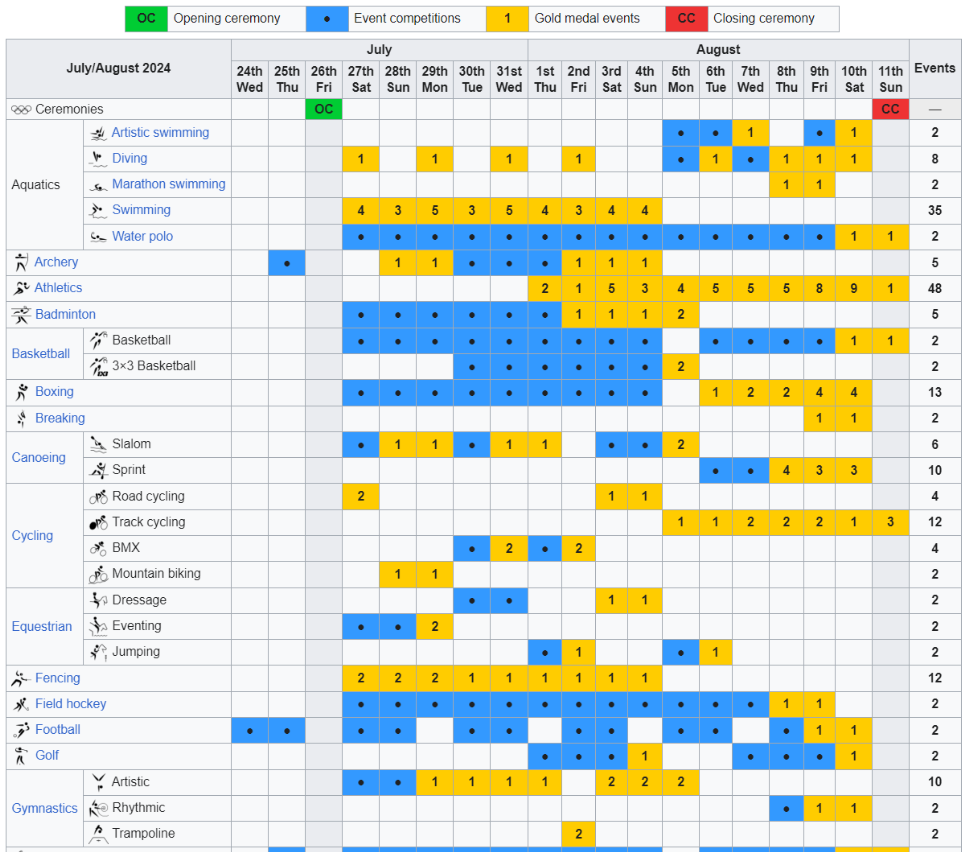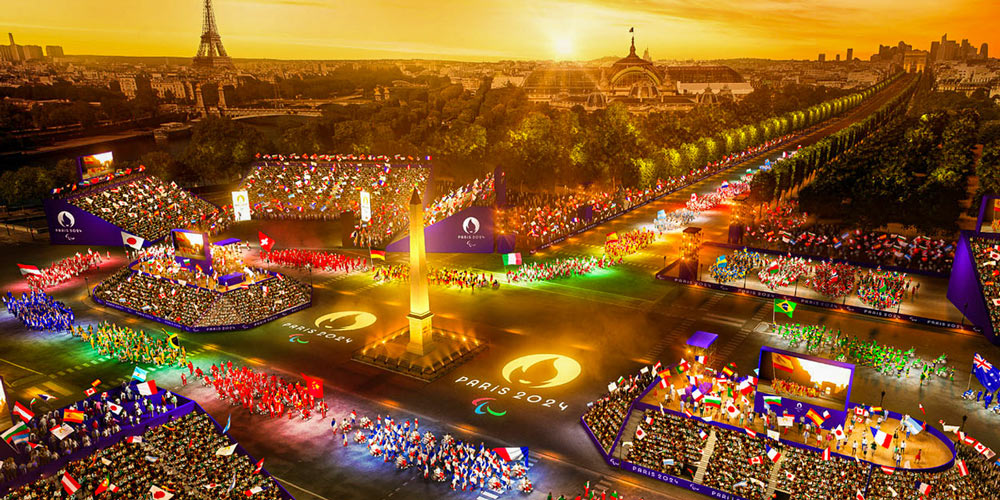Understanding the Olympic Schedule: Breaking At The Summer Olympics Schedule

The Summer Olympics schedule is a complex and intricate system that ensures the smooth and efficient execution of a multitude of sporting events over a period of 17 days. This intricate schedule involves coordinating thousands of athletes, coaches, officials, and volunteers from around the world.
Structure of the Olympic Schedule, Breaking at the summer olympics schedule
The Olympic schedule is structured around a daily breakdown of events, with each day featuring a variety of sports competitions. The schedule is designed to maximize spectator engagement and provide a diverse range of events to appeal to a wide audience. Each day’s schedule is carefully planned to ensure that no two major events clash, allowing spectators to enjoy multiple events throughout the day.
Sports and Their Respective Schedules
The Summer Olympics feature a diverse range of sports, each with its own unique schedule.
- Aquatics: Swimming, diving, synchronized swimming, and water polo events are spread throughout the Games, with preliminary rounds and finals taking place over several days.
- Athletics: Track and field events, including sprints, long jump, and marathon, are typically held in the latter half of the Games, culminating in the highly anticipated 100-meter sprint finals.
- Badminton: Badminton competitions take place over several days, with individual and team events being held in the early to mid-stages of the Games.
- Basketball: Basketball competitions are spread throughout the Games, with preliminary rounds, quarter-finals, semi-finals, and the final taking place over a week or more.
- Boxing: Boxing competitions are held throughout the Games, with preliminary rounds, quarter-finals, semi-finals, and the final taking place over a week or more.
- Canoeing: Canoe and kayak events, including sprint and slalom, are typically held in the early to mid-stages of the Games.
- Cycling: Cycling events, including road races, track cycling, and mountain biking, are spread throughout the Games, with some events taking place in the early stages and others towards the end.
- Equestrian: Equestrian events, including dressage, show jumping, and eventing, are typically held in the early to mid-stages of the Games.
- Fencing: Fencing competitions are held throughout the Games, with individual and team events taking place over several days.
- Football: Football competitions are held throughout the Games, with preliminary rounds, quarter-finals, semi-finals, and the final taking place over a week or more.
- Gymnastics: Gymnastics competitions, including artistic gymnastics, rhythmic gymnastics, and trampoline, are typically held in the early to mid-stages of the Games.
- Handball: Handball competitions are held throughout the Games, with preliminary rounds, quarter-finals, semi-finals, and the final taking place over a week or more.
- Hockey: Hockey competitions are held throughout the Games, with preliminary rounds, quarter-finals, semi-finals, and the final taking place over a week or more.
- Judo: Judo competitions are held throughout the Games, with individual events taking place over several days.
- Rowing: Rowing events, including sculling and sweep rowing, are typically held in the early to mid-stages of the Games.
- Sailing: Sailing events are held throughout the Games, with different classes of boats competing over several days.
- Shooting: Shooting competitions are held throughout the Games, with individual and team events taking place over several days.
- Table Tennis: Table tennis competitions are held throughout the Games, with individual and team events taking place over several days.
- Taekwondo: Taekwondo competitions are held throughout the Games, with individual events taking place over several days.
- Tennis: Tennis competitions are held throughout the Games, with individual and doubles events taking place over several days.
- Volleyball: Volleyball competitions, including beach volleyball and indoor volleyball, are held throughout the Games, with preliminary rounds, quarter-finals, semi-finals, and the final taking place over a week or more.
- Weightlifting: Weightlifting competitions are held throughout the Games, with individual events taking place over several days.
- Wrestling: Wrestling competitions are held throughout the Games, with individual events taking place over several days.
Factors Influencing Event Scheduling
Several factors influence the scheduling of events at the Summer Olympics, ensuring a balanced and engaging program for athletes and spectators alike.
- Time Zones: The scheduling of events takes into account the time zones of participating athletes and spectators, aiming to minimize travel disruptions and ensure prime-time viewing opportunities for global audiences.
- Athlete Availability: The scheduling of events considers the availability of athletes, ensuring that they have adequate rest and recovery time between competitions. Athletes are typically given a minimum number of days between their events to allow for proper preparation and performance.
- Venue Capacity: The capacity of venues is a crucial factor in event scheduling, ensuring that enough seating is available for spectators while accommodating the needs of athletes and officials. The scheduling of events takes into account the popularity of different sports and the anticipated demand for tickets.
- Event Flow: The scheduling of events is designed to create a smooth flow of activity throughout the Games, with a variety of events taking place throughout the day. This ensures a diverse and engaging experience for spectators and keeps the momentum of the Games going.
Key Moments and Events

The Summer Olympics are a spectacle of athletic prowess, where the world’s best athletes converge to compete for glory. The Games are filled with anticipation for iconic events, potential record-breaking performances, and unexpected upsets. These moments shape the narrative of the Olympics, leaving lasting impressions on both athletes and spectators.
Iconic Events
The Summer Olympics feature a diverse range of sports, each with its own unique set of iconic events. These events often draw massive viewership and capture the imaginations of fans worldwide.
- The 100m Sprint: This event is often referred to as the “fastest race on earth,” and it consistently delivers thrilling finishes. Athletes like Usain Bolt have used this event to cement their legacy as Olympic legends.
- The Men’s Marathon: This grueling race tests the limits of human endurance. The marathon has been a staple of the Olympics since the Games’ inception, and it continues to inspire awe with its tales of perseverance and triumph.
- The Women’s Gymnastics All-Around: This event showcases the incredible athleticism and artistry of the world’s best gymnasts. Gymnasts like Simone Biles have redefined what is possible in this demanding discipline.
Potential for Breaking Moments
The Olympics are a stage for athletes to push the boundaries of human potential. Every Games brings the possibility of record-breaking performances and unexpected upsets.
- Swimming: Swimmers consistently break world records, especially in events like the 100m freestyle and the 200m butterfly. The advancements in training and technology contribute to this continuous evolution of swimming performance.
- Athletics: The track and field events, particularly the long jump, high jump, and javelin throw, are known for their unpredictable nature. Athletes often surprise the world with their remarkable feats of strength and athleticism.
- Team Sports: In team sports like basketball, soccer, and volleyball, the competition can be intense, leading to thrilling finishes and unexpected upsets. The unpredictable nature of these events adds to the excitement and suspense of the Games.
Historical Context
The Olympic Games have a rich history, and many of the iconic events have evolved over time. The Games have served as a platform for social change and the advancement of athleticism.
- The Women’s Marathon: The inclusion of the women’s marathon in the 1984 Olympics was a landmark moment for women’s sports. It represented a significant step towards gender equality in athletics.
- The Paralympic Games: The integration of the Paralympic Games into the Olympic movement has broadened the scope of the Games, celebrating the achievements of athletes with disabilities. This inclusion has fostered a more inclusive and diverse athletic community.
The Impact of Schedule Changes

The Olympic schedule is a complex and constantly evolving entity, with changes implemented every four years to optimize the experience for athletes, spectators, and broadcasters. These adjustments can have significant consequences for the competition dynamics and the overall performance of athletes. Analyzing the impact of these changes requires a nuanced understanding of the potential benefits and drawbacks they introduce.
Changes in Athlete Performance
The impact of schedule changes on athlete performance is a multifaceted issue. While some changes may enhance performance by providing athletes with more rest or better opportunities for acclimatization, others may negatively affect performance by disrupting training routines or leading to increased fatigue.
- Increased Rest and Recovery: Shifting events to later time slots or spreading out competitions can provide athletes with more time for rest and recovery, potentially leading to improved performance. For example, moving the marathon to the evening in Tokyo 2020 allowed athletes to compete in cooler temperatures, reducing the risk of heat exhaustion and improving overall performance.
- Improved Acclimatization: Adjusting the schedule to align with athletes’ peak performance times can enhance their ability to acclimatize to the host city’s climate and conditions. This is particularly important for events like swimming and track and field, where environmental factors can significantly influence performance.
- Disrupted Training Routines: Schedule changes can disrupt athletes’ carefully planned training regimens, leading to decreased performance. Athletes may have to adapt their training schedules to accommodate new event times, potentially impacting their physical and mental preparation.
- Increased Fatigue: Competing in multiple events close together can lead to increased fatigue and decreased performance. Schedule changes that cluster events together may create a higher risk of burnout and injuries.
Breaking at the summer olympics schedule – The Summer Olympics schedule is a carefully crafted spectacle, a tightly choreographed dance of athletic prowess. But what happens when the schedule breaks? Perhaps we should take a lesson from Dolton Mayor Tiffany Henyard , a leader who navigates the unpredictable with a vision for the future.
Just as Henyard guides her community, the Olympic organizers must adapt and overcome unforeseen challenges, ensuring the Games remain a testament to human resilience and athletic excellence.
The Summer Olympics schedule is a constant battleground, with each sport vying for primetime slots and coveted viewership. The inclusion of sport climbing combined Olympics live has undoubtedly added to the scheduling complexities, pushing other disciplines to the margins and highlighting the ongoing struggle for visibility in the ever-expanding Olympic program.
This relentless fight for attention only serves to further fracture the already fragmented Olympic experience.
